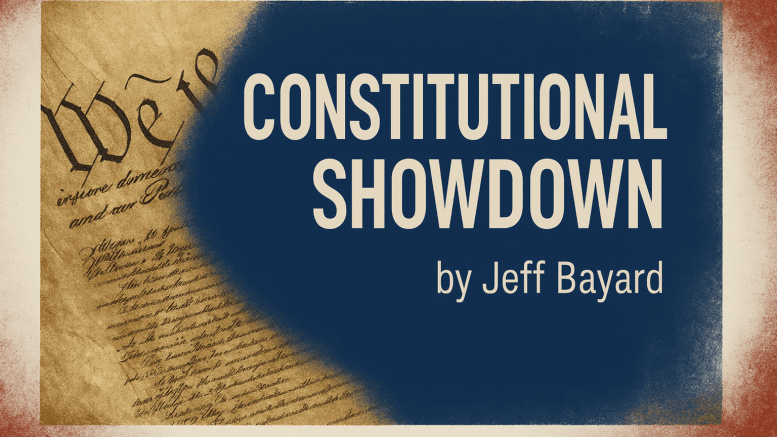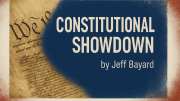Playback speed:
The Virginia Christian Alliance continues our Constitutional Showdown series framed from the Christian Worldview and Constitutional originalism, exposing how modern courts twist the framers’ original intent while equipping believers to defend constitutional truth through faithful citizenship and prayer.
Wednesday morning, November 5th, the Supreme Court hears oral arguments in what President Trump calls “one of the most important cases in the history of our country.” He’s not exaggerating.
The stakes: $2 trillion in foreign investment commitments, hundreds of thousands of American jobs, and a fundamental question about whether our 18th-century Constitution can address 21st-century challenges when Congress refuses to act.
Back in September, we published a comprehensive analysis examining this case through what we call the Third Way framework
—the integration of biblical truth and constitutional principle to pursue justice without partiality.
That 6,800-word deep dive laid out the constitutional tensions, economic stakes, and spiritual dimensions of this unprecedented case.
Wednesday’s oral arguments bring that analysis into sharp focus. Here’s what’s changed—and what Christians need to watch for.
What’s New Since September
The Price Tag Is Real—and Growing
When we wrote in September, the $2 trillion figure represented future commitments. Now? American businesses have already paid $90 billion to cover these tariffs through September 2025—more than half of all tariff revenue collected in fiscal year 2025. That number climbs daily while the case plays out.
Trump admitted in a Fox Business interview: if the Supreme Court rules against him, “we’d have to pay back money.” We’re talking about potentially the largest government refund in American history.
Trump May Attend—Unprecedented
The President has floated personally attending oral arguments on Wednesday. If he does, he’d become the first sitting president in American history to attend Supreme Court arguments. That’s how high the stakes are.
The Court Knows It’s Critical
SCOTUS expanded argument time from the standard 60 minutes to 80 minutes. Translation: the justices recognize the magnitude of this case. Expect arguments to run much longer as nine justices grapple with questions that have no easy answers.
The Human Cost Keeps Mounting
Since September, more communities have staked their futures on these investments:
- The 1,500 families depending on Stellantis’s Belvidere, Illinois plant reopening
- Workers anticipating Honda’s Indiana consolidation
- Families counting on Samsung’s South Carolina expansion
- Entire regions banking on manufacturing revival after decades of decline
These aren’t statistics. They’re image-bearers of God whose economic futures hang in the balance.
The Constitutional Crisis Hasn’t Changed
The fundamental tension we outlined in September remains: What happens when constitutional means prove inadequate to fulfill the government’s God-given duty to protect citizens?
Romans 13:4 establishes government as “God’s servant for your good.” For decades, Congress failed to address systemic trade abuse that decimated American manufacturing. Trump acted where Congress wouldn’t—securing unprecedented foreign investment and job creation. But he used emergency powers that courts now question.
As we wrote in September: “Which duty takes precedence: constitutional process or protective governance?”
Wednesday, the Supreme Court begins answering that question.
Three Possible Outcomes (What to Watch For)
Our September analysis outlined three scenarios. Here’s how the oral arguments look right now:
Scenario 1: Broad Rejection (The Process Purist Path)
What it means: The Court says Trump lacks authority under IEEPA to impose tariffs for trade policy
Constitutional impact: Massive reinforcement of legislative primacy; future presidents heavily constrained
Economic impact: Catastrophic
EU and Japan have made clear that their commitments depend on legal certainty. Expect immediate freezing of investments, cancellation of manufacturing relocations, and potential loss of 400,000-600,000 jobs.
Listen for: Justices questioning whether “trade deficits” constitute genuine “emergencies” under the statute
Scenario 2: Narrow Compromise (The Split-the-Baby Approach)
What it means: The Court distinguishes between national security tariffs (steel, aluminum, automotive) and broader levies
Constitutional impact: Establishes boundaries for emergency powers while preserving some presidential authority
Economic impact: Moderate disruption. Investment commitments would require renegotiation; job losses around 150,000-250,000 rather than complete collapse.
Listen for: Justices drawing lines between different statutory authorities (Section 232 vs. IEEPA)
Scenario 3: Broad Validation (The Executive Power Path)
What it means: Court upholds Trump’s emergency trade authority
Constitutional impact: Significantly expands presidential power; creates precedent future presidents (of both parties) will invoke for domestic emergencies
Economic impact: All investments proceed; maximum job creation; manufacturing renaissance continues
Listen for: Justices deferring to presidential judgment on foreign affairs and national security
The Third Way Perspective: What’s Really at Stake
The Third Way framework—the integration of biblical truth and constitutional principle to pursue justice without partiality—guides our analysis of this constitutional crisis. It’s not a political compromise or centrist ideology. It’s originalism grounded in the Framers’ Christian worldview, applied to cases where both political extremes abandon constitutional truth.
We’ve used this framework throughout our Constitutional Showdown series. In Louisiana v. Callais, we showed how the Reconstruction Framers rejected BOTH racial gerrymandering AND racial quotas—charting a biblical middle path between discrimination and favoritism. In our analysis of birthright citizenship, we demonstrated how original intent protects citizenship rights without creating incentives for illegal immigration.
The tariffs case demands the same principled approach.
The Biblical Mandate: Government exists as “God’s servant for your good” (Romans 13:4) to protect citizens, promote their welfare, and ensure justice in commercial relationships. Proverbs 11:1 condemns “dishonest scales”—exactly what foreign nations’ systematic trade manipulation represents. For decades, American workers bore the cost of exploitative trade practices while Congress refused to act. God’s mandate for governmental protection doesn’t disappear when constitutional processes prove inadequate.
The Constitutional Constraint: The Framers deliberately gave Congress authority over commerce (Article I, Section 8) to prevent executive abuse and ensure democratic accountability. They understood that concentrated power corrupts, and that taxation without representation sparked the Revolution itself. This wisdom remains sound even when its application creates practical challenges. Emergency powers exist for genuine crises, not to bypass legislative responsibility indefinitely.
The Third Way Tension: When constitutional processes fail to serve their underlying purposes—when congressional gridlock enables continued exploitation of American workers and communities—does biblical governance require accepting that harm? Or does government’s God-given protective duty justify alternative means, even if those means raise constitutional questions?
This isn’t a simple case of executive overreach versus effective governance. It’s a profound test of whether our constitutional system can fulfill its fundamental purposes when traditional processes break down. The Trump tariffs achieved unprecedented results: $2 trillion in foreign investment commitments, hundreds of thousands of promised jobs, manufacturing renaissance in devastated communities. Yet the emergency powers used to secure these outcomes challenge separation of powers principles the Framers embedded to prevent tyranny.
The Third Way refuses the false choice. We can simultaneously affirm:
- Congress abdicated its responsibility, harming American workers for decades
- Trump’s tariffs addressed real exploitation and achieved legitimate governmental purposes
- Emergency powers have constitutional limits that courts must enforce
- Any remedy must preserve both governmental effectiveness AND constitutional constraints
The question isn’t whether Trump’s goals were legitimate—protecting American workers clearly serves government’s biblical mandate. The question is whether the means comported with constitutional design, and what precedent this sets for future presidents who will inevitably claim similar authority for different ends.
Wednesday’s oral arguments matter because the Court must navigate between two equally dangerous extremes: constitutional paralysis that renders government incapable of protecting citizens, or unlimited executive power that destroys the separation of powers safeguarding liberty. Neither extreme serves the Constitution’s purposes or honors the Framers’ design.
The Third Way—if the justices can find it—would distinguish legitimate emergency authority from dangerous precedent, preserve necessary presidential flexibility while maintaining meaningful constraints, and enable effective governance without abandoning constitutional limits. That’s the narrow path between two errors.
Finding it requires wisdom beyond human capacity. That’s why prayer matters.
What Christians Should Do Today
1. Pray for Wisdom
James 1:5 promises: “If any of you lacks wisdom, let him ask God, who gives generously to all without reproach, and it will be given him.”
The justices face an impossible choice with eternal implications for American governance and citizen welfare. They need divine wisdom that transcends legal precedent.
Pray specifically:
- For clarity in distinguishing legitimate emergency authority from dangerous precedent
- For courage to rule according to constitutional principle regardless of political pressure
- For concern for the human cost of legal decisions—the families and communities affected
- For Congress to finally fulfill its responsibility to address trade policy properly
2. Watch and Learn
Oral arguments begin Wednesday (November 5) at 10 AM EST. Audio will be available same-day at supremecourt.gov.
Listen for how justices balance:
- Separation of powers concerns vs. governmental effectiveness
- Statutory text vs. practical consequences
- Presidential deference vs. congressional primacy
- Economic stakes vs. constitutional principle
3. Engage Your Representatives
Regardless of how the Court rules, Congress remains constitutionally empowered to address trade policy through proper legislation. The political will simply hasn’t existed.
Contact your senators and representatives:
- Demand comprehensive trade reform that protects American workers
- Insist on congressional action rather than continued abdication of responsibility
- Support legislation that clarifies emergency authority boundaries
Find your representatives: house.gov/representatives/find-your-representative
4. Read Our Full Analysis
This 1,000-word update can’t capture the depth of constitutional, economic, and spiritual dimensions at stake.
Our September deep dive examines:
- Complete biblical framework for governmental purpose
- Detailed constitutional analysis through originalist lens
- Economic impact modeling showing what $2 trillion actually means
- Regional effects on specific communities and industries
- The precedent problem for future presidential power
- Congressional responsibility for creating this crisis
- Natural law principles underlying constitutional authority
Read the full analysis: Constitutional Showdown: When Protecting America Collides with Constitutional Process
The Bottom Line
Wednesday’s oral arguments won’t resolve this crisis immediately. The Court likely won’t rule until late December or early 2026. But the arguments will reveal how justices are thinking and what concerns dominate their analysis.
For Christian constitutional conservatives, this case exposes the deepest tensions in our political theology: How do we honor both divine mandates for effective governance and constitutional constraints designed to prevent abuse?
There’s no perfect answer. That’s why the Third Way framework matters—it refuses simplistic solutions while pursuing justice without partiality, acknowledging complexity while remaining grounded in biblical truth and constitutional fidelity.
Psalm 127:1 reminds us: “Unless the LORD builds the house, those who build it labor in vain.” Our ultimate hope doesn’t rest on Supreme Court decisions but on God’s sovereignty over nations, courts, and the economic futures of His people.
Still, God commands us to pursue justice, defend the vulnerable, and engage governance challenges with wisdom and courage. Wednesday’s arguments represent one crucial moment in that ongoing calling.
The stakes are real. The principles matter. And God remains sovereign over the outcome.
Watch. Pray. Stay informed. And remember that constitutional governance—for all its difficulties—remains one of God’s greatest gifts to humanity for restraining evil and promoting human flourishing.
Wednesday, we’ll see whether our constitutional system can adapt to modern challenges while preserving the constraints that make it worth defending.
WHAT TO WATCH WEDNESDAY:
Oral Arguments: November 5, 10 AM EST
Audio: Available same-day at supremecourt.gov
Key Players:
- Neal Katyal (representing businesses challenging tariffs)
- U.S. Solicitor General (defending Trump administration)
- Lawyers representing 12 states
Expected ruling: Late December 2025 or January 2026
Comment Policy: We welcome thoughtful and respectful dialogue from all viewpoints. Comments must remain civil, relevant, and free of profanity, personal attacks, or mockery of Christian faith. Disagreement is allowed—disrespect is not.
Jeff Bayard is a devoted Christian, husband of 45 years, father of two, grandfather of three, and content manager at Virginia Christian Alliance, where he champions biblical values, conservative principles, and constitutional truths through the Constitutional Showdown series.


